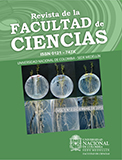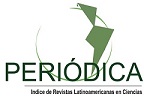Diseño e implementación de una estrategia didáctica para la enseñanza y el aprendizaje de la función lineal modelando situaciones problema a través de las TIC
Design and implementation of a didactic strategy for the linar function teaching-learning process by modeling problem sites using ICT
Keywords:
Aprendizaje significativo, estrategia didáctica, función lineal, modelación, situaciones problemas (es)Significant learning, didactic strategy, linear function, modeling, problem sites (en)
Downloads
Este artículo tiene como intención diseñar e implementar una estrategia didáctica para la enseñanza–aprendizaje de la función lineal modelando situaciones problema, con el uso de las Tecnologías de la Información y de la Comunicación (TIC) en el grado noveno de la Institución Educativa La Salle de Campoamor. Con esta práctica docente, se busca que los estudiantes adquieran un mejor aprendizaje del concepto de la función lineal en las matemáticas, y su importancia en la modelación de situaciones problema, a través de una herramienta virtual de aprendizaje como lo es la plataforma Moodle. El interés de los estudiantes hacia el uso de los computadores, es una valiosa oportunidad para fomentar el desarrollo de competencias matemáticas, siguiendo los estándares establecidos por el Ministerio de Educación a través de los lineamientos curriculares.
References
Ausubel, D. P., Novak, J. D., Hanesian, H. (1983). Psicología Educativa: Un punto de vista cognitivo, Editorial Trillas: México.
Batanero, C., Font V., Godino J. (2003). Enseñanza y aprendizaje de las Matemáticas. Didáctica de las Matemáticas para maestros. Proyecto Edumat-Maestros.
Bravo, G., Tavera, C., y Tibocha, G. (1999). Propuesta para explorar la comprensión de aspectos de la función lineal.
Gómez, G. (2006). El uso de la Computadora en la Manipulación y Conversión de los Registros de Representación para el estudio de la función lineal. Tegucigalpa.
Hitt, F. (1994). Teacher Difficulties with the Construction of Continuous and Discontinuous Functions. Focus Learning Problems in Mathematics. Fall Edition, 1994, Volume 16, Number 4. Center For teaching / Learning of Mathematics.
Islas, C., Martínez, E. (2008). El uso de las de las TIC como apoyo a las actividades docentes.
MEN (1998). Lineamientos Curriculares: Matemáticas. Ministerio de Educación Nacional. Magisterio. Bogotá, Colombia.
Moodle (2012). Sistema de Gestión del Aprendizaje. [Fecha de consulta: Agosto 25 de 2012]. Disponible en: http://www.moodle.org
Moreira, M. A. (1997). Aprendizaje Significativo: un Concepto Subyacente. Encuentro Internacional de Aprendizaje Significativo. (págs. 19 - 44). España: Burgos.
Moreira, M. A. (2006). Aprendizaje Significativo Crítico. Indivisa: Boletín de Estudios e Investigación (6), 83-102.
Rodríguez, M. L. (2004). Aprendizaje Significativo e Interacción Personal. En M. A. Moreira, M. C. Caballero, & M. L. Rodríguez, Aprendizaje Significativo: Interacción Personal, Progresividad y Lenguaje (págs. 15-46). España: Universidad de Burgos.
How to Cite
APA
ACM
ACS
ABNT
Chicago
Harvard
IEEE
MLA
Turabian
Vancouver
Download Citation
Article abstract page views
Downloads
License
The authors or copyright holders of each paper confer to the Journal of the Faculty of Sciences of Universidad Nacional de Colombia a non-exclusive, limited and free authorization on the paper that, once evaluated and approved, is sent for its subsequent publication in accordance with the following characteristics:
- The corrected version is sent according to the suggestions of the evaluators and it is clarified that the paper mentioned is an unpublished document on which the rights are authorized and full responsibility is assumed for the content of the work before both the Journal of the Faculty of Sciences, Universidad Nacional de Colombia and third parties.
- The authorization granted to the Journal will be in force from the date it is included in the respective volume and number of the Journal of the Faculty of Sciences in the Open Journal Systems and on the Journal’s home page (https://revistas.unal.edu.co/index.php/rfc/index), as well as in the different databases and data indexes in which the publication is indexed.
- The authors authorize the Journal of the Faculty of Sciences of Universidad Nacional de Colombia to publish the document in the format in which it is required (printed, digital, electronic or any other known or to be known) and authorize the Journal of the Faculty of Sciences to include the work in the indexes and search engines deemed necessary to promote its diffusion.
- The authors accept that the authorization is given free of charge, and therefore they waive any right to receive any emolument for the publication, distribution, public communication, and any other use made under the terms of this authorization.
- All the contents of the Journal of the Faculty of Sciences are published under the Creative Commons Attribution – Non-commercial – Without Derivative 4.0.License
MODEL LETTER OF PRESENTATION and TRANSFER OF COPYRIGHTS
Personal data processing policy
The names and email addresses entered in this Journal will be used exclusively for the purposes set out in it and will not be provided to third parties or used for other purposes.




















